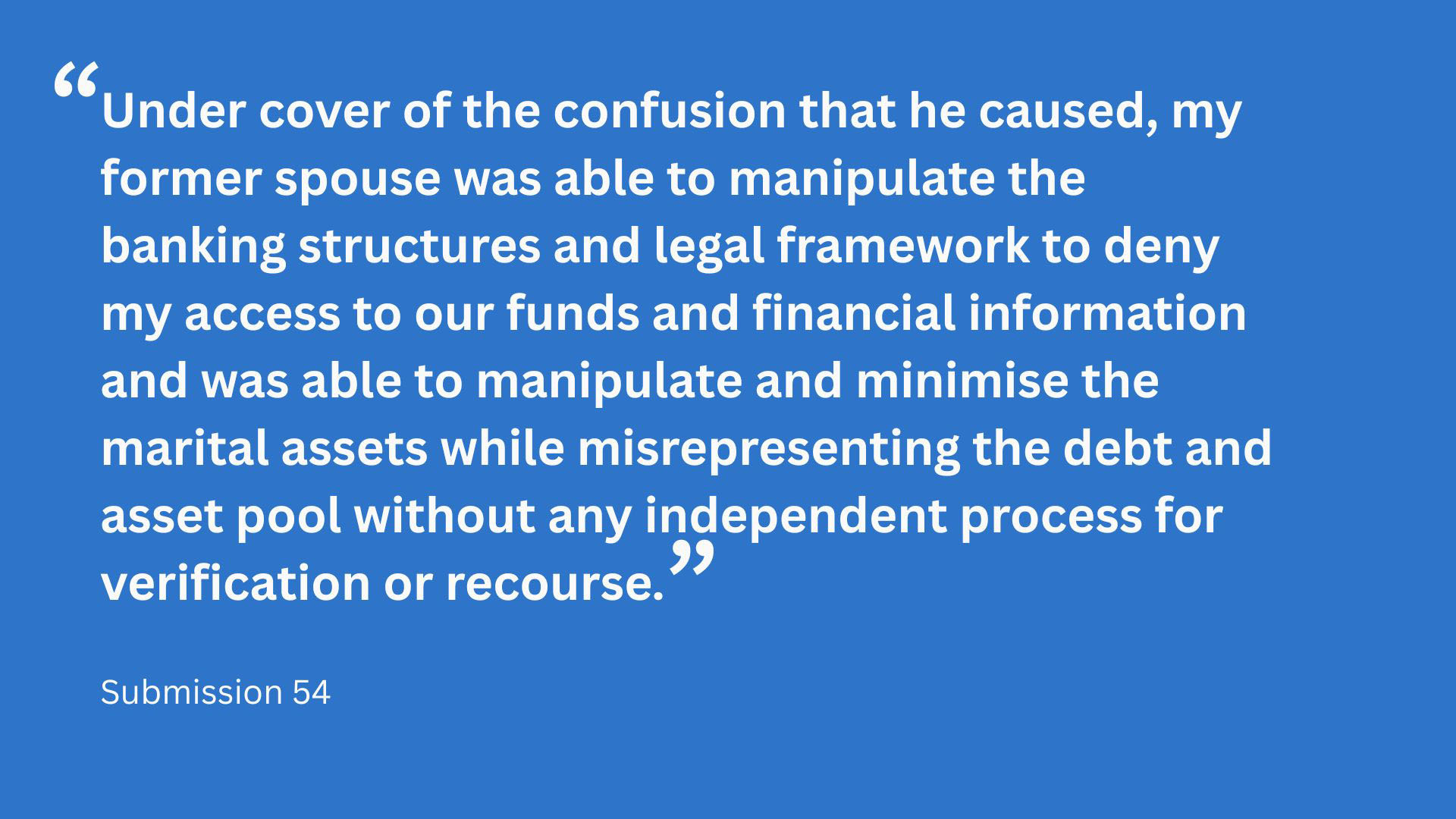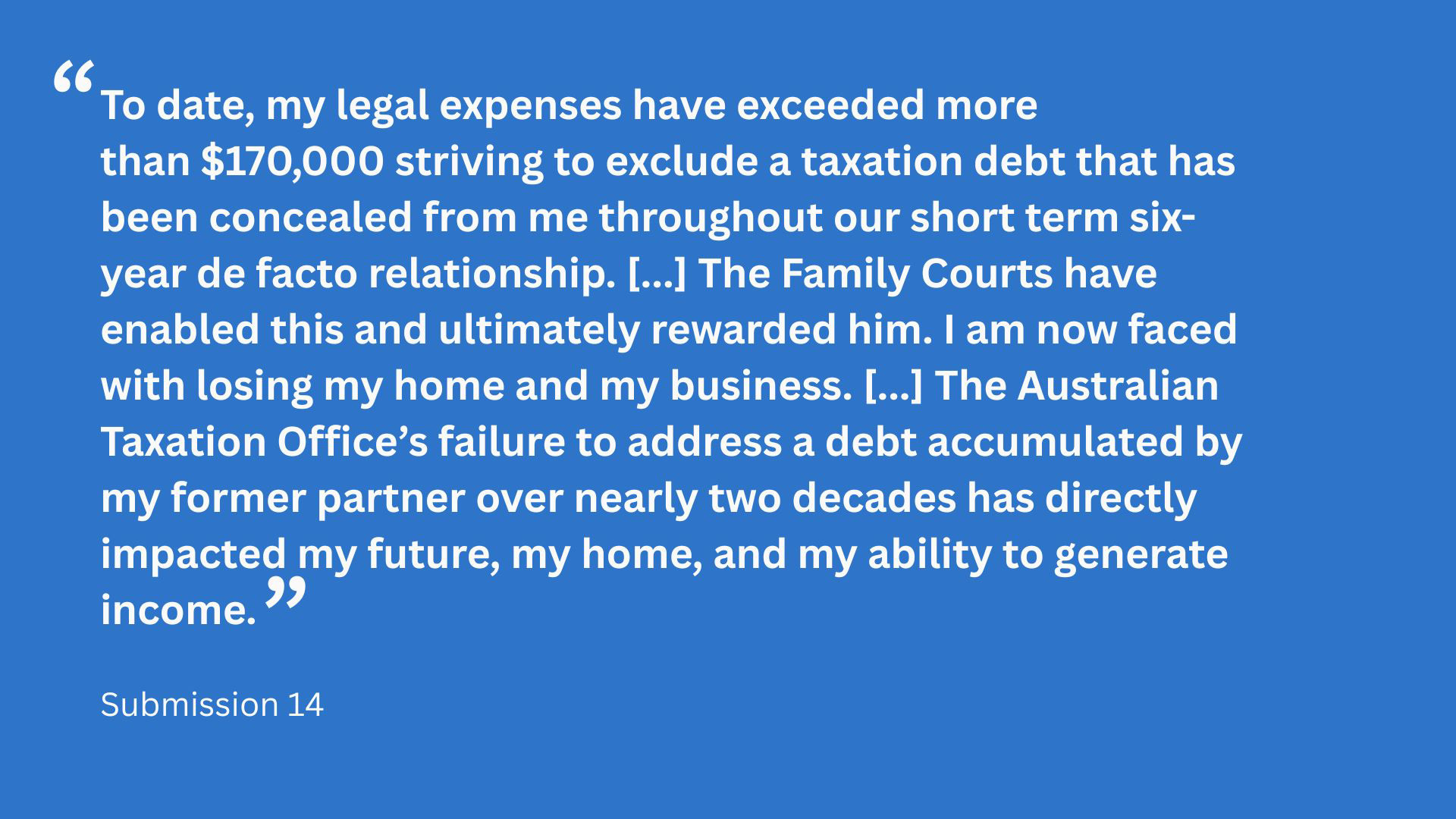
Accountants, banking managers and lawyers could be unintentionally helping facilitate financial abuse within relationships, Australian research has found.
In Australia, it's estimated 16% of women have experienced economic abuse by a partner. In New Zealand, 15% of women have experienced intimate partner financial abuse.
Intimate partner financial abuse is when someone in a relationship does things to control or sabotage their partner’s access to money and other financial resources.
The research, done by Swinburne University of Technology and Southern Cross University, looked at accessible submissions from individuals who had experienced intimate partner financial abuse. The submissions came from the Australian Parliamentary Joint Committee on Corporations and Financial Services inquiry into financial abuse in 2024.
Looking at 19 submissions (made up of the experiences of 18 women and one man), the researchers were able to analyse and map out links “within and between systems that are implicated in the perpetuation of financial abuse”.
In their journal article, Mapping Intimate Partner Financial Abuse Across Public and Private Systems, the researchers say people in those roles could create “barriers to the identification of financially abusive behaviours, inserting time and distance between the perpetrator’s abusive act and the impact on the victim-survivor".
This could lead to professionals obscuring and distributing assets away from, and transferring debts to people experiencing intimate-partner financial abuse.
'Inadvertent conduits of financial abuse'
Tax returns being manipulated to reduce income or gatekeeping financial knowledge of family businesses were some ways accountants were “inadvertent conduits of financial abuse”.
When it came to banking systems, victim-survivors talked about how easy it was for their perpetrators to take control of joint bank accounts and open accounts in their names. The research also found banking systems were used for fraudulent loans and victim-survivors shared how after break-ups, they were denied access to finances.
Submissions talking about people's experiences with lawyers, mediators and the judiciary in Australia spoke about the high costs of taking part in mandatory mediation which led to no resolutions, not being able to afford legal representation while their perpetrators could use former joint family funds to hire lawyers and the misuse of family law processes.

And public systems like the Australian Taxation Office, the child support system and Centrelink could act as “endpoints” of financial abuse where harm was felt well after couples had broken up.
In their submissions, victim-survivors spoke about being forced to cover debts after former partners lied about their incomes, how they were receiving less support from these services and how perpetrators would gain personal wealth through manipulation and moving joint money.

Professor Kay Cook, one of the authors, says while there were some accountants or lawyers who were willing participants, this wasn't widespread.
"I think a lot of accountants or family lawyers haven't really thought about this," she says, "they would be shocked to think they're aiding in financial abuse".

What sticks out to Cook from the research is how broken the systems are - making it hard to see malicious intent.
"The systems work on the assumption people will follow the rules and do the right things. It looks like people are following the rules and doing the things but when you piece it all together, they're really using the system to cause harm.
"Just the time and distance that gets put between their intention and their action and the outcome is what makes it imperceptible."
It is usually on the victim-survivors to find evidence to prove the injustice, she says, but there often isn't a remedy.
In a lot of cases, especially when it came to public systems like tax and child support, they have limited powers to discharge debts, she says.
Power structures in society
"Men are assumed to be the heads of households, they're the decision makers, they control the finances - a lot of that is just unquestioned," she says, and it's often assumed that men speak for their partners in these situations.
"It all rests on who is representing the 'family' in these interactions."
And this is baked into everything, Cook says, from parental leave to the gender wage gap and childcare.
"We're still treating people as households and we need to think about them as individuals ... it's a cultural change."
Through looking at these systems, Cook says this reflects what the power structures are in society - and this isn't just limited to Australia or New Zealand.
What could be done to help fix these problems
For accountants, lawyers and those in banking, Cook says solutions may be possible by putting in mandatory professional development activities and statements in their codes of practice on financial abuse, or even having it as part of undergraduate training.
"It's downstream impacts of their practice."
Everything is connected and it is important for practitioners to be aware of this, and at least be able to refer people on or bring other people in, she says.
The research also suggests future designs of financial systems should think about "the pathways that perpetrators use" to "better identify abusive tactics and intervene before significant harms occur".
A lot was happening in Australia in this area and the Government was leading the charge, Cook says. "I think Australia will be really leading the charge around what is possible."
Where to get help in New Zealand:
- To report your experience to the police, call 111 or the non-emergency line 105
- Women’s Refuge: 0800 REFUGE or 0800 733 843 (available 24/7)
- Shine: 0508 744 633 (available 24/7)
- Are You Ok: 0800 456 450
- Shakti: 0800 742 584 (available 24/7)
Where to get help in Australia:
- Call 000 if you need help immediately
- 1800 Respect National Helpline: 1800 737 732
- Women’s Crisis Line: 1800 811 811
- Men’s Referral Service: 1300 766 491
- Lifeline: 131 114

We welcome your comments below. If you are not already registered, please register to comment
Remember we welcome robust, respectful and insightful debate. We don't welcome abusive or defamatory comments and will de-register those repeatedly making such comments. Our current comment policy is here.